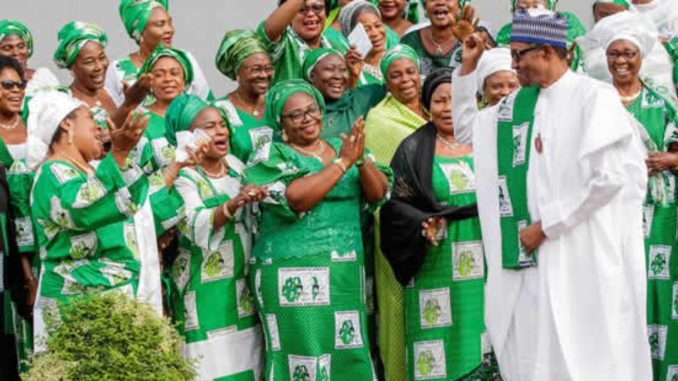
WOMEN’s political fortunes in the country dwindled further with the outcome of the 2019 general election. This is not good for the society, our democracy and the global effort to ramp up their participation in the decision-making process and leadership.
The Independent National Electoral Commission disclosed at the annual national convention of the Nigerian League of Women Voters recently that only 62 women won elective positions out of the 2,970 that contested. Six women were elected to the Senate, 11 to the House of Representatives, 40 to the state Houses of Assembly, while four women became deputy governors.
While no woman has been elected as governor since 1999, and the presidential seat appears to be light years away, their number elected to the National Assembly serves, therefore, as the most important barometer to calibrate their inclusion in Nigeria’s democracy. The 2019 performance represents 4.17 per cent of the total of elected officials as against the 5.65 per cent in the 2015 general election. The plunge in the Reps figure makes the picture clearer: in 2011, it had 26 women representatives and 19 in 2015 and the 11 just elected.
The steady fall underpins the clamour by many women groups and other stakeholders for more appointive positions to be given to the fairer sex. Since the fourth World Conference on women, Beijing, China in 1995 that came up with the 30 per cent inclusivity and endorsed by the United Nations, the gender policy campaign has spiked in Nigeria. But it has not taken firm root even when Nigeria went ahead to promise 35 per cent balance above the global target.
As researchers have identified, lack of finance, low level of education, violence, religious and cultural barriers conflate to undermine women or gender balance in our democratic space. Evidently, Nigeria ranks high among countries where the phenomenon is dominant.
With the high monetisation of electoral contest in Nigeria, only a few women can match their men folk. Vote-buying in 2019 was so bizarre that voters were paid N5,000 each at some polling units in some states. According to the Nigerian Civil Society Situation Room, vote-buying was prevalent in Lagos, Delta, Kano, Enugu, Oyo, Bauchi, Zamfara, Osun, Kebbi, Plateau and Nasarawa states. Some parties such as the ruling All Progressives Congress and the Peoples Democratic Party had before the polls indicated that the elections would require a heavy financial war chest with their astronomical cost of nomination forms.
The APC raked in N12.6 billion from this process. An aspirant coughed up N8 million for the senatorial ticket: (N1 million for expression of interest and N7 million for nomination form); Reps seat, N350,000 expression of interest and N3.5 million form fee.
Besides fiscal straits, women are further muzzled by thuggery that often leads to maiming, killings and hijacking of ballot boxes. All this resulted in 58 deaths in the last elections. In 2003, about 100 people were killed, while 300 died in 2007, claims the United States Institute for Peace. Such a do-or-die electoral landscape, undoubtedly, shrinks the space for women’s participation.
A shift from this has become absolutely imperative because of its benefits. According to Women In Politics and other international groups, women lawmakers are better than men in championing laws that address childcare, pension and elimination of violence against women. The national average for women’s political participation in Nigeria is 6.7 per cent, by far below the global average of 22.5 per cent. Africa’s regional average is 23.4 per cent, while that of the West African sub-region is 15 per cent. Therefore, the crusade for improvement here should not begin in 2023, but now.
In fact, the exclusion of women, being the most dominant in our electoral demographics, undermines the very essence of democracy – majority decision. The Latin American nations have done better in gender balance in politics and it has paid off in formulating polices, which affect the down-trodden. Cuba, Bolivia and Mexico, according to Inter-Parliamentary Union statistics, are ranked second, third and fourth respectively, in global women representation in their lower legislative chambers. There are 322 women out of 605 in Cuba, 69 out of 130 in Bolivia and 241 in 500-member parliament in Mexico.
Rwanda is the global leader here. It has 49 women out of 80 in its parliament. Other African top performers are Ethiopia with 212 women out of 547; Mozambique 99 out of 250; Egypt 89 over 596 and Ghana 36 out of 275 parliamentarians.
To join this league, Nigeria should overhaul its democratic space to uproot electoral violence and monetisation of elections. Very critical is the swift enforcement of legal sanctions against violators, dismantling of cultural barriers against women and exponentially improve on girl-child education. It is under such a progressive culture that Ellen Johnson-Sirleaf (Liberia); Margaret Thatcher (United Kingdom); Indira Gandhi (India); Sahle-Work Zawde (Ethiopia); Zuzana Caputova (Slovakia); Golda Meir (Israel); and Angela Merkel of Germany, among others, emerged as heads of government of their respective countries. With the high level of international concern about gender-balance in leadership, the challenge is no more a feminine agenda, but a national crusade, with the Federal Government and the men folk having critical roles to play.
END

Be the first to comment